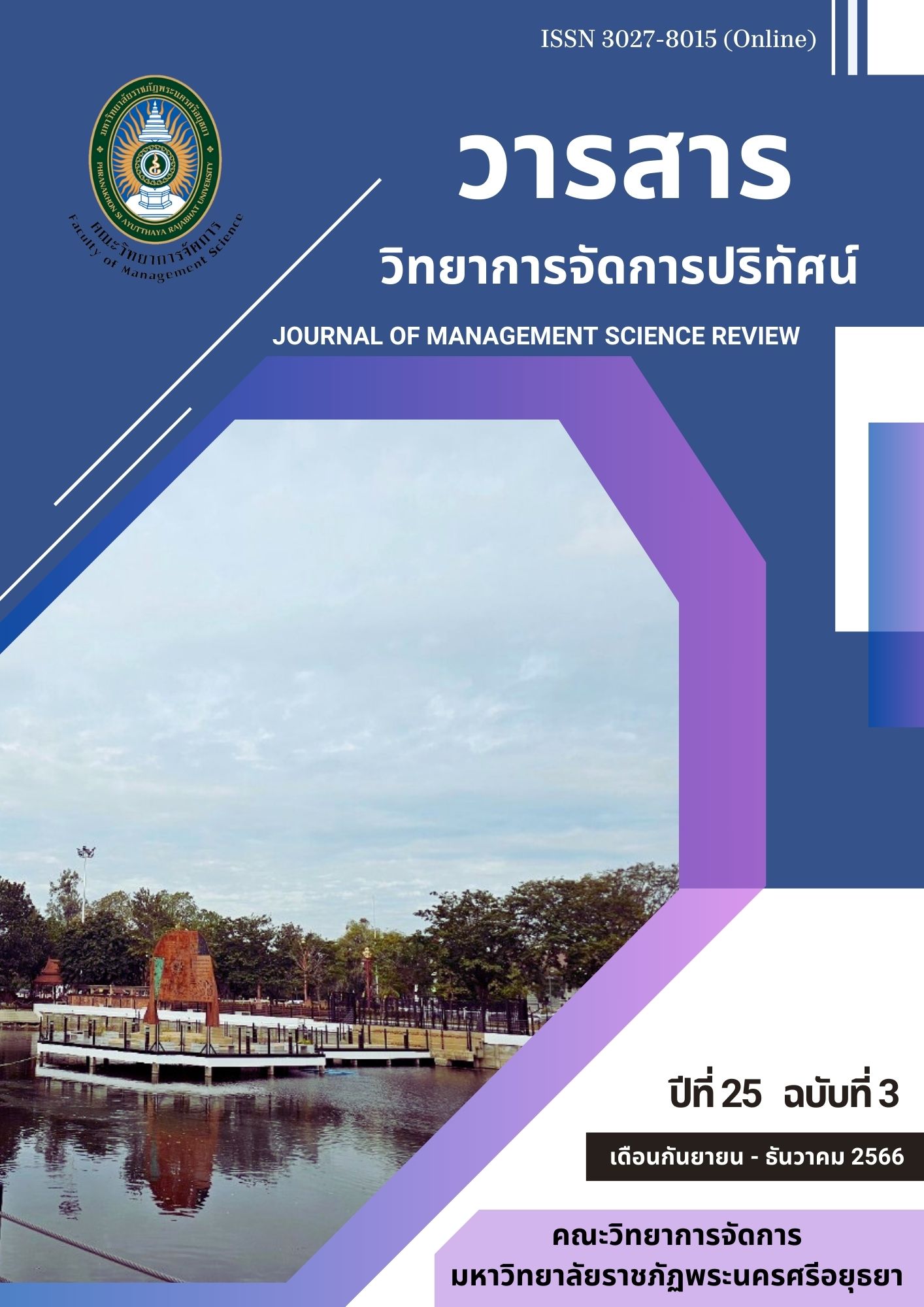ปัจจัยทุนมนุษย์และการจัดการธุรกิจเชิงกลยุทธ์กับความสำเร็จขององค์กรธุรกิจในยุคดิจิทัล
คำสำคัญ:
ทุนมนุษย์, การจัดการธุรกิจ, การจัดการเชิงกลยุทธ์, ความสำเร็จของธุรกิจบทคัดย่อ
บทความนี้มีวัตถุประสงค์เพื่อนำเสนอเกี่ยวกับปัจจัยทุนมนุษย์และการจัดการธุรกิจเชิงกลยุทธ์กับความสำเร็จขององค์กรธุรกิจ โดยการสืบค้นและรวบรวมข้อมูลจากเอกสาร บทความวิชาการ รวมถึงงานวิจัยที่เกี่ยวข้อง และวิเคราะห์ข้อมูลด้วยการสรุปและตีความจากเอกสารและงานวิจัยที่เกี่ยวข้องเพื่อนำเสนอตามวัตถุประสงค์ และ ผลการศึกษา พบว่า ทุนมนุษย์ หมายถึง ทรัพยากรที่มีอยู่ในตัวบุคลากรในองค์กร ได้แก่ ความรู้ความชำนาญ ความสามารถ ความสามารถพิเศษ ทักษะ ปัญญา ความคิดสร้างสรรค์ ดุลพินิจ และประสบการณ์ ส่วนการจัดการธุรกิจเชิงกลยุทธ์เป็นกระบวนการเลือกทางเลือกในการจัดการธุรกิจที่เหมาะสม เพื่อนำไปปฏิบัติให้บรรลุตามวัตถุประสงค์ ในขณะที่ปัจจัยด้านทุนมนุษย์และการจัดการธุรกิจเชิงกลยุทธ์มีความเกี่ยวข้องกับความสำเร็จขององค์กรธุรกิจอย่างใกล้ชิด เนื่องจากองค์กรธุรกิจนั้นดำเนินการด้วยคนหรือทรัพยากรมนุษย์ซึ่งจะต้องใช้ทุนมนุษย์ในการดำเนินการ และการวัดความสำเร็จขององค์กรธุรกิจในยุคดิจิทัลสามารถวัดด้วยแนวคิดการจัดการแบบสมดุล โดยสามารถจำแนกได้เป็น 2 ลักษณะ ประกอบด้วย (1) ความสำเร็จที่เป็นตัวเงิน เช่น ความสำเร็จในการลดต้นทุนและสร้างรายได้กับผลกำไร และ (2) ความสำเร็จที่ไม่เป็นตัวเงิน เช่น ความพึงพอใจของลูกค้า และความสำเร็จในการพัฒนาบุคลากรในองค์กร
เอกสารอ้างอิง
Amadeo, K. & Boyle, M. J. (2021). What Is Human Capital: Definition, Examples & Impact of Human Capital. The Balance. Retrieved May 24, 2021, from shorturl.asia/NplwI:
Becker, G. S. (1964). Human Capital: A Theoretical and Empirical Analysis with Special Reference to Education. New York: National Bureau of Economic Research.
Boyte-White, C. (2019). What are Some Examples of Different Types of Capital?. from https://www.investopedia.com/ask/answers/032715/what-are-some-examples-different-types-capital.asp
Connolly, T., Conlon, E. J., & Deutsch, S. J. (1980). Organizational effectiveness: a multiple constituencies approach. Academy of Management Review, 5(2), 211 – 217.
Fitz-Enz, J. (2000). ROI of human capital: measuring the economic value of employee performance. New York: AMACOM.
Hitt, M. A. (1988). The measuring of organizational effectiveness: multiple domains and constituencies. Management International Review, 28(2), 28 – 40.
Joungtrakul, J. (2021). Human Capital: A Secret Weapon for Individual, Organization and National Development. Bangkok: North Bangkok University.
Kane, G. C., et al. (2015). Strategy, Not Technology, Drives Digital Transformation. MIT Sloan Management Review, 2015(1), 1 – 25.
Kaplan, R. S., & Norton, D.P. (1996a). The Balanced Scorecard: Translating Strategies into Action. Boston: Harvard Business School Press.
Kenton, W. & Sonnenshein, M. (2020). Human Capital. Investopedia. retrieved May, 25 2021, from shorturl.asia/zbIQH
Porter, M. E. (1990). The Competitive Advantage of Nations. New York: Free Press
Rowe, W. G., & Morrow, J. L., Jr. (1999). A note on the dimensionality of the firm financial performance construct using accounting, market, and subjective measures. Canadian Journal of Administrative Sciences, 16(1), 58 – 70.
Scott. (1990). A matter of record: Documentary sources in social research. Cambridge: Polity press.
_______. (2006). Documentary research. London: Sage.
Sereya Tungnarumit. (2015). Factors related to the success of small and medium enterprises in Prachuap Khili Khan Province [Master’ thesis]. Silpakorn University.
Settapong Malisuwan. (2017). The year of disruption. Retrieved August 1, 2023, From http://tct.or.th.
Shultz, T. W. (1961). Investment in Human Capital. The American Economic Review, 15(1), 1 – 17.
Schwartz, E.I. (2001). Digital Darwinism: 7 Breakthrough Business Strategies for Surviving in the Cutthroat Web Economy. New York: Broadway Books.
Singer, S. J., & A. C. Edmondson. (2006). When Learning and Performance are at Odds: Confronting the Tension. Massachusetts: Harvard University.
Thomas, J. E. (2017). Scholarly Views on Theory: Its Nature, Practical Application, and Relation to World View in Business Research. International Journal of Business and Management, 12(9), 231 – 240.
Tonsorn, M. (2012). Business strategy. Bangkok: Expernet.
Ulrich, D., Allen, J., Brockbank, W., Younger, J., & Nyman, M. (2009). HR Transformation: Building Human Resources from the Outside In. New York: McGraw Hill.
Venkatraman, N., & Ramanujam, V. (1986). Measurement of business performance in strategy research: a comparison of approaches. Academy of Management Review, 1(4), 801 – 814.
Yencongka, B. et al. (2006). Strategic Management. Bangkok: BK Publishing.
Zammuto, R. F. (1984). A comparison of multiple constituency models of organizational effectiveness. Academy of Management Review, 9(4), 606 – 616.





